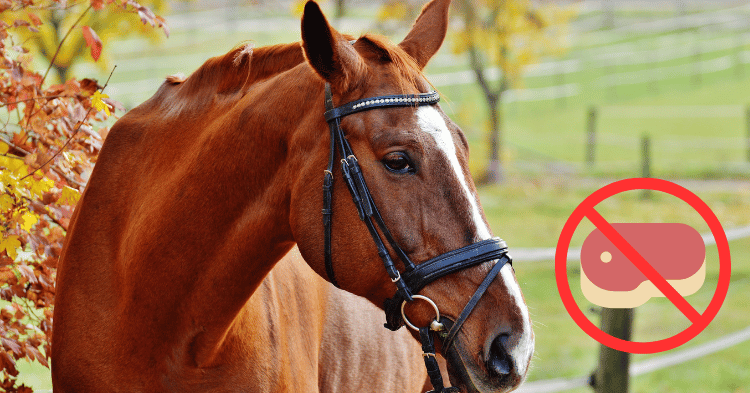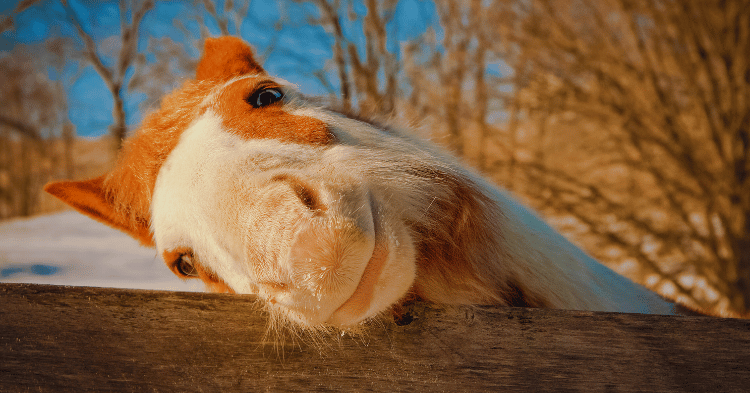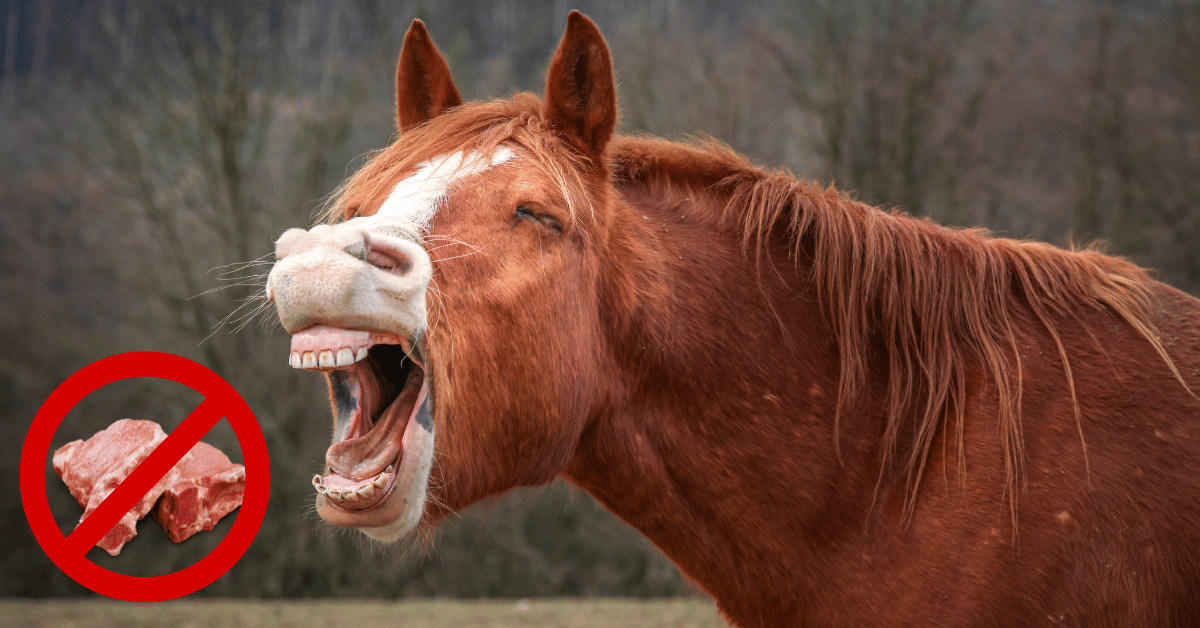The idea of a horse eating meat might sound bizarre, but it’s a question worth exploring: do horses eat meat? Horses are herbivores by nature, with a digestive system designed to process fibrous plants, grasses, and hay. Their long intestines and specialized teeth make them perfect grazers, not carnivores.
That said, there have been rare accounts of horses nibbling on meat, usually out of curiosity rather than hunger. These instances are anomalies, as meat provides no nutritional value to them and can be hard on their digestive systems.
A horse’s natural diet is centered around forage, with occasional supplements like grains or fruits for energy. Ensuring they stick to this plant-based diet keeps their digestive tract healthy and functioning as nature intended. While meat might intrigue a horse for a moment, it’s far from their dietary norm or preference.
The Herbivorous Nature of Horses
Horses, magnificent and powerful creatures, have evolved as herbivores, thriving on a diet that is rich in plant materials. Understanding their dietary essentials and their foraging behavior provides insights into why a plant-based diet is crucial for their health and well-being.
Herbivore Diet Essentials
Horses are primarily herbivores with a diet rich in forage and fibrous plant material. They spend about 15 to 17 hours a day grazing, consuming a variety of grasses, shrubs, leaves, flowers, bark, and herbs. This extended grazing time supports their digestive system, which is designed to process large amounts of fibrous materials. The digestive tract of a horse is highly specialized, with a foregut that digests simple carbohydrates, proteins, and oils, and a large hindgut dedicated to fermenting and breaking down fiber.
| Component | Function |
|---|---|
| Foregut | Digests simple carbohydrates, proteins, and oils |
| Hindgut | Ferments and breaks down fiber |
Experts unanimously agree that adhering to a plant-based diet is crucial for horses’ health and well-being, aligning with their physiological design as herbivores (Equine Institute). It is essential to provide them with a diet that mimics their natural feeding habits to ensure optimal health.
Foraging Behavior of Horses
Wild horses exhibit a diverse foraging behavior, consuming various parts of plants based on the changing seasons. Their diet includes a mix of grasses, shrubs, and other plant materials, providing them with a balanced intake of nutrients. On average, grass makes up about 82% of their diet, making it their preferred food (Kentucky Equine Research).
| Diet Composition | Percentage (%) |
|---|---|
| Grass | 82 |
| Shrubs, Leaves, Flowers, Bark, Herbs | 18 |
Understanding the importance of grass and other fibrous materials in a horse’s diet can help owners provide a more balanced and natural feeding regimen. By replicating the diverse and fibrous diet of wild horses, domesticated horses can maintain their health and thrive in various environments.
For more information on horse health and other related topics, you can explore articles like do horse produce milk and do horses eat hay. These resources offer valuable insights into maintaining the well-being of these majestic animals.
Understanding that horses are naturally herbivorous and providing them with a diet rich in forage and plant materials ensures their digestive health and overall well-being. The intricate balance of their diet underscores the importance of adhering to their natural dietary patterns.
Why Horses Should Avoid Meat

Digestive System Limitations
Horses are naturally herbivorous animals, with digestive systems specifically adapted to process plant-based diets. Their stomachs and intestines are designed to break down fibrous plant matter, not meat. Attempting to introduce meat into their diet can lead to significant disruptions in their gut microbiome, causing a range of digestive issues (Equine Institute).
The horse’s digestive system involves a foregut and hindgut, which together allow for optimal fermentation of plant materials. Unlike carnivores, who have short digestive tracts designed for meat digestion, horses rely on longer digestive processes to extract nutrients from plants. Feeding them meat can compromise this system, leading to inefficiency and potential health risks.
Risks of Including Meat in Diet
Introducing meat to a horse’s diet can result in various health complications. Horses are not equipped to handle the proteins and fats found in meat, which can lead to severe digestive distress. Issues such as colic and diarrhea are common when meat is added to their diet (Strathorn Farm). Additionally, the risk of broken teeth and other dental problems increases due to the different texture and chewing requirements of meat.
| Health Issue | Potential Cause |
|---|---|
| Digestive distress | Inability to process meat efficiently |
| Colic | Meat causing blockages or fermentation issues |
| Diarrhea | Disruption of gut microbiome |
| Dental problems | Inappropriate texture for horse teeth |
| Nutritional imbalances | Insufficient plant-based nutrients |
Beyond digestive concerns, there are risks associated with nutritional imbalances and pathogen exposure. Meat can carry parasites and bacteria that horses are not adapted to fight off, leading to increased risks of infections and food poisoning. Moreover, horses on meat-inclusive diets often experience nutritional deficiencies, as meat lacks many essential vitamins and minerals required for their health.
For these reasons, it is crucial for horse owners to adhere to a plant-based diet to ensure their animals’ well-being. For more information on appropriate nutritional care, visit our articles on can horses eat bananas and can horses eat celery.
Uncommon Instances of Meat Consumption

Rare Scenarios of Meat Consumption
While horses are herbivores, there are notable yet rare instances where horses have been observed consuming meat. These occurrences are often driven by environmental stressors or nutritional deficiencies. For example, horses in Russia have been documented eating fish, while those in Australia have been known to consume small animals and birds when faced with extreme circumstances (Equine Institute).
In circumpolar climates, horses sometimes eat salted fish during the winter months as a source of protein and fat. This adaptability showcases their ability to modify their diet under harsh conditions (Quora). Additionally, domestic horses have been observed consuming small birds and even rodents. These behaviors are usually sporadic and not a normal part of a horse’s diet.
Here is a summary table:
| Scenario | Region | Remark |
|---|---|---|
| Fish Consumption | Russia, Circumpolar Climates | Protein and fat source during winter |
| Small Animals and Birds | Australia | Stress-induced adaptation |
| Rodents and Nestlings | Various | Observed in domestic settings |
Behavioral Adaptations to Limited Diets
Horses may also exhibit unusual eating behaviors, such as consuming non-plant materials, to cope with limited dietary resources. For instance, horses have been seen chewing on bones and antlers, possibly to absorb minerals. Some horse owners have reported their horses eating unconventional items like pizza, further illustrating their adaptive behavior (Quora).
There are also anecdotal reports of horse owners incorporating animal-based products like fish oil into their horses’ diets, believing it could improve their health. However, mainstream veterinary science does not support this practice due to the herbivorous nature of horses and the potential risks involved.
For those interested in horse diet, our articles on can horses eat bananas, can horses eat watermelon, and can horses eat apples provide further insights into healthy, plant-based options.
Optimal Nutrition for Horses
Plant-Based Diet Importance
Adhering to a plant-based diet is crucial for horses, aligning with their physiological design as herbivores. Their digestive systems are specifically evolved to process a diet rich in plant matter. Horses have a long digestive tract designed to break down fibrous plant material efficiently, thereby extracting necessary nutrients.
Horses thrive on a diet that includes a variety of forage, which provides essential fiber for proper digestion and gut health. The digestive systems of horses are not capable of efficiently processing meat, which can lead to disruptions in their gut microbiome and potential health issues such as nutritional imbalances and exposure to pathogens.
Recommended Nutritional Components
To ensure optimal health for your horse, it’s important to provide a balanced diet that includes the following nutritional components:
Energy
Horses require energy that is primarily sourced from carbohydrates and fats. Forage, such as hay and pasture grass, provides a significant portion of this energy.
Protein
Protein is essential for muscle development and repair. Horses obtain protein from forage and concentrates (not meat). High-quality hay and certain grains are good sources of protein.
Fiber
Fiber is crucial for proper digestion and maintaining gut health. Horses on a fiber-rich diet have better digestion and nutrient absorption. Most of a horse’s fiber comes from forage.
Vitamins and Minerals
Horses need a variety of vitamins and minerals to support overall health. These can be provided through a combination of high-quality forage, grains, and supplements if necessary.
| Nutrient | Source | Importance |
|---|---|---|
| Energy | Forage, Grains | Provides energy for daily activities |
| Protein | High-quality Hay, Grains | Muscle development and repair |
| Fiber | Hay, Pasture Grass | Aids digestion and gut health |
| Vitamins/Minerals | Forage, Supplements | Supports overall health |
For additional information regarding appropriate dietary choices for horses and various nutritional tips, you can explore our articles on do horses eat hay, can horses eat bananas, and can horses eat celery.
In conclusion, a diet that aligns with a horse’s natural herbivorous tendencies is vital. By providing a balanced, plant-based diet, horse owners can ensure that their animals remain healthy and happy.

